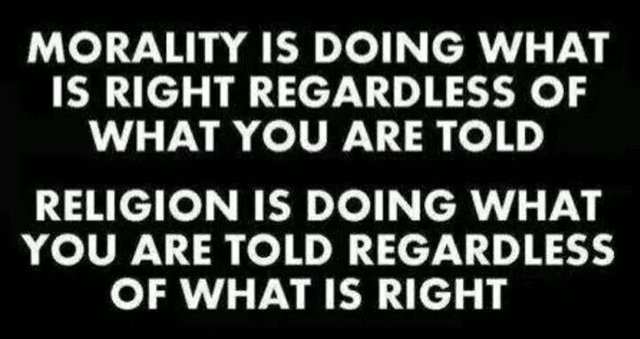The Morality of Atheism
Being raised in a Baptist household, I had been taught that there was no greater threat to the American way of life than atheism and agnosticism. Some people believed in different gods than the Christian god, but that was okay to my family. They could easily prove other religious people wrong because they did not have a divinely inspired book. They thought they did, but my family believed Satan manipulated these people.
For four years after becoming an atheist, I hid it from my family. Eventually, it had to come out. My parents found out that I no longer held to Christian beliefs after I was caught having sex with an ex-girlfriend. My parents sat me down and said I could no longer see that “piece of white trash” because she had gotten into my head. As they questioned my atheism, calling it “just a phase”, I answered most of their questions without incident. The only question I got really stumped on was “Where does your morality come from if you don’t believe in God?” At first, I was taken aback by this question. My parents pressed further, “What’s stopping you from becoming a serial killer?” I laughed it off because it is a ridiculous question, but the question about the source of my morality I had never considered. I had defined morality as just being a good person, being loyal, working hard, and helping others whenever possible. Realizing that this definition was weak, I sought a stronger one. I read a few books and kept up with atheist groups online because my family would fight with me whenever possible now that I had told them about my atheism.
The only explanation for morality that makes sense is that we are all born with a sense of morality. Much like practice and exposure to mathematics makes us better students of the art, exposure to morality can make us better people. It is a commonly held belief within the church that we are all born with sin. Some argue that original sin is transmitted through sex, and others believe it just happens because Adam and Eve sinned in the Garden of Eden. Personally, I believe we learn more from our mistakes in life than we do from our successes, and we should not be afraid of making mistakes. However, many of humanity’s mistakes and prejudices have been intricately woven into our belief systems, and now we call them sins.
The realization I have come to in my pursuit of the definition of morality is that most people consider morality to be dictated by artificial constraints created by other humans, such as religion. However, it is important to note that morality had to be around before religions were created by mankind and long before Christianity could have been founded. Without working together to achieve common goals, humanity could not exist as it is today. As a result of cooperation with one another, morality was created out of our interest in self-preservation.
If I am a shepherd and you grow lettuce, I get more through trade than if I just kill you and take your lettuce. As humanity developed and free trade grew, we discovered new technologies and founded cities and villages. This could only exist if there was a common law among the citizens of these towns. These laws would have first come from our interest in self-preservation such as “Do not steal” and “Do not murder” for the betterment of us all. Eventually, this original approach to morality would be warped by religion, dictating how we should and should not live our lives, taking away the core of human liberty.
As an atheist, I cannot say I get my morality from a book that is largely rendered irrelevant. I learned my morality by realizing that, at my core, I had a set of beliefs that I felt would help the world and myself such as loyalty, perseverance, and a love for life and the human experience with others. Morality is something we learn as children by watching the rest of humanity. We copy them, and sometimes we build onto the foundation they created.
I go to The King's College in the financial district of New York City, this is a short essay I wrote for my historical theology class this semester. Enjoy!



That is what I think too, morality has nothing to do with religion. Religion only hijacks it and tries to monopolize. More about this issue:
Morality does not fall magically from the sky
Objective Morality
Cool post
http://www.businessinsider.com/richard-dawkins-religion-morality-2015-10
Congratulations @williamdevine! You have received a personal award!
Click on the badge to view your own Board of Honor on SteemitBoard.
For more information about this award, click here
We've seen religious people do or advocate for all kinds of immoral things, so I do agree that talking about the Bible as a good source of morality is ridiculous. Even most devout Christians know their "divine" book is not to be trusted, or they would be following all the laws in there, not just the ones they like. And even their internal moral compasses are better than what religion has to offer, they just give it credit for things it deserves none for.
Congratulations @williamdevine! You received a personal award!
You can view your badges on your Steem Board and compare to others on the Steem Ranking
Vote for @Steemitboard as a witness to get one more award and increased upvotes!